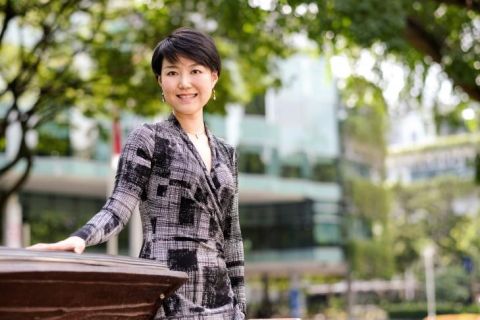We must focus on the well-being of people when building a futuristic Singapore, says SMU Professor David Chan at the inaugural Singapore Scientific Conference 2015.
By Ying Ying Lee
SMU Office of Research (Sept. 26, 2015) – While there has been talk of cities having flying cars ten years from now, Singapore has more ambitious and complex plans than that: it aims to become the world’s first “smart nation”—a country that seamlessly integrates technology into businesses and the everyday life of individuals. In fact, mobile applications (‘apps’) that provide real-time information on public transport and small-scale test beds of smart public housing are already commonplace here. But what else can Singaporeans look forward to and how should we think about the future?
Singapore’s smart nation movement has attracted research and development (R&D) interest both locally and internationally, particularly in areas relevant to Singapore such as healthcare innovation and urban solutions. This movement was robustly discussed among top policymakers and researchers at the inaugural Singapore Scientific Conference (SSC) 2015, held over 16-17 September 2015.
SSC 2015 was jointly organised by the Agency of Science, Technology and Research (A*STAR), the National University of Singapore (NUS), Nanyang Technological University (NTU), Singapore Management University (SMU) and the Singapore University of Technology and Design (SUTD), as part of the nationwide Science@50 initiative to mark 50 years of excellence in science on the nation’s golden jubilee birthday.
“As part of stepping up to the national level, the conference this year has also correspondingly shifted from simply presenting on the hard sciences to look at ‘big themes’ with national and also international relevance such as public health, personalised medicine, technology in society, as well as the related topic on privacy,” said Mr. Lim Chuan Poh, A*STAR’s chairman, in his opening address for SSC 2015.
Solve urban issues by focusing on people’s well-being
In one of the keynote sessions at the conference, David Chan, professor of psychology, director of the Behavioural Sciences Institute at SMU, and co-director of the Centre for Technology and Social-Behavioural Insights (jointly established by A*STAR and SMU), emphasised the importance of social and behavioural sciences when examining liveability issues in Singapore.
Highlighting the country’s population profile as an important determinant of liveability, Professor Chan said that the Singapore of the future is likely to look vastly different from today. Not only is the population ageing, but the composition of its people is also changing due to immigration, he added. Hence, one has to look at issues of quality in addition to issues of quantity.
“When you talk about land and liveability in relation to the population, bear in mind that it is not just about physical numbers such as densities of areas or the number of recreational areas or other amenities available,” he said. “It is also about the nature of the interactions and quality of the relationships that people have with one another, which in the aggregate constitute the social capital of the city and country.”
How scientists can contribute, he said, is to provide evidence-based recommendations to help maintain a very good quality of life both despite and because of high-density living. While the intuitive response to a high population density is to reduce the number of people in a given physical area, it may sometimes have the unintended negative consequence of compromising the vibrancy that comes along with the availability of a wide variety of amenities and activities in the community.
Furthermore, planning for a liveable city also requires policy makers to distinguish between people’s needs and wants, as well as to understand that these are complex and dynamic. Needs usually refer to basic goods or services that everyone requires for subsistence living—the reasonable provision of food, accommodation and healthcare facilities are good examples. Wants, on the other hand, such as the variety of entertainment, are not necessary but desirable.
Professor Chan cautioned against assuming that we always know what people need and want, or that conducting surveys will lead to the answers. Needs and wants differ across different segments of the population and can also change over time even within the same segment, he explained. Appropriate scientific study design and data analysis techniques are necessary to study the dynamic nature of people’s needs and wants, as well as the impact of policy changes in the long term.
“People’s needs and wants will evolve in different directions. Good governments need to enable the conditions that allow people to make informed choices that improve their quality of life,” he shared.
Futures thinking: a framework for scientists and technologists
When investing into R&D to “futurise” Singapore, Professor Chan proposed a “futures thinking” framework for scientists and technologists to approach their work. This framework includes which areas to focus on and how to implement them.
He highlighted that futures thinking is not the same as the scenario-based planning methodology that many policymakers and practitioners in Singapore are familiar with. While traditional scenario planning is focused on producing multiple distinct plausible futures, futures thinking involves identifying parameters of change that matter the most, and the principles of emergence from changes at one level of analysis to another, he said. This, in turn, will require researchers to understand to limitations of traditional statistical methods for studying these dynamic changes and be familiar with the advances in data analytic techniques that could be used to address them.
“At the end of the day, our role as researchers is to provide rigorous and relevant inputs for policy decision making. This involves the ability to produce strong theory-driven and data-driven study findings from multiple methods and disciplines. When these findings triangulate, we can make evidence-based recommendations to improve people’s well-being and create a better future for Singapore,” said Professor Chan.
See More News
Want to see more of SMU Research?
Sign up for Research@SMU e-newslettter to know more about our research and research-related events!
If you would like to remove yourself from all our mailing list, please visit https://eservices.smu.edu.sg/internet/DNC/Default.aspx
